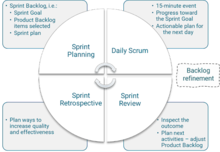
Back سكرم (تطوير البرمجيات) Arabic Scrum Bulgarian Scrum Catalan Scrum Czech Scrum Danish Scrum German Σκραμ Greek Scrum (desarrollo de software) Spanish Scrum Estonian اسکرام (توسعه نرمافزار) Persian
This article has multiple issues. Please help improve it or discuss these issues on the talk page. (Learn how and when to remove these messages)
|
| Part of a series on |
| Software development |
|---|

Scrum is an agile team collaboration framework commonly used in software development and other industries.
Scrum prescribes for teams to break work into goals to be completed within time-boxed iterations, called sprints. Each sprint is no longer than one month and commonly lasts two weeks. The scrum team assesses progress in time-boxed, stand-up meetings of up to 15 minutes, called daily scrums. At the end of the sprint, the team holds two further meetings: one sprint review to demonstrate the work for stakeholders and solicit feedback, and one internal sprint retrospective. A person in charge of a scrum team is typically called a scrum master.[2]
Scrum's approach to product development involves bringing decision-making authority to an operational level.[3] Unlike a sequential approach to product development, scrum is an iterative and incremental framework for product development.[4] Scrum allows for continuous feedback and flexibility, requiring teams to self-organize by encouraging physical co-location or close online collaboration, and mandating frequent communication among all team members. The flexible approach of scrum is based in part on the notion of requirement volatility, that stakeholders will change their requirements as the project evolves.[5]
- ^ Cite error: The named reference
scrumguidepdf2020was invoked but never defined (see the help page). - ^ "What Is A Scrum Master? Everything You Need To Know – Forbes Advisor". www.forbes.com. Retrieved November 16, 2023.
- ^ Schwaber, Ken (February 1, 2004). Agile Project Management with Scrum. Microsoft Press. ISBN 978-0-7356-1993-7.
- ^ "What is Scrum?". What is Scrum? An Agile Framework for Completing Complex Projects – Scrum Alliance. Scrum Alliance. Retrieved February 24, 2016.
- ^ J. Henry and S. Henry. Quantitative assessment of the software maintenance process and requirements volatility. In Proc. of the ACM Conference on Computer Science, pages 346–351, 1993.